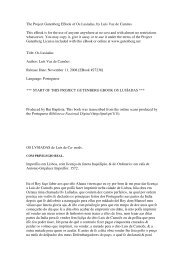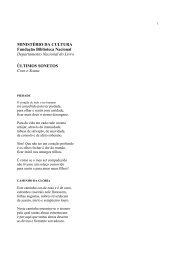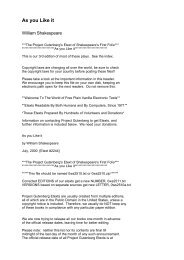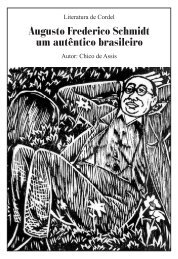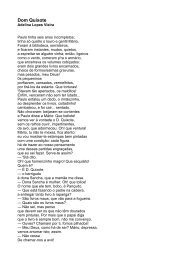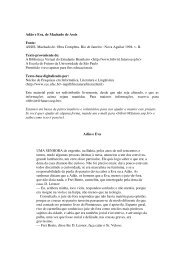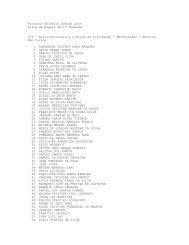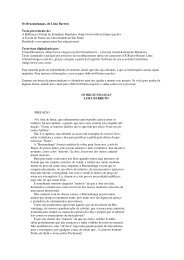Create successful ePaper yourself
Turn your PDF publications into a flip-book with our unique Google optimized e-Paper software.
'Their cuissart-studs up to the socket braced'<br />
boutoir, the sharp spike on the knee-piece.<br />
crible. The word refers to the visor with seven bars, which was one of the marks of a<br />
marquis's rank.<br />
mortier. The round cap which was the ancient emblem of sovereignty in France. It was<br />
worn by barons who possessed full powers of administering justice in their domains,<br />
also by the presidents of the 'parlements', and by the chancellors. A modified form is<br />
still part of the official dress of some of the judges of the highest courts.<br />
It will be noted that the antiquities in this passage are French, not German.<br />
tortil, a ribbon twisted round a crown, the special ornament of a baron, not of a duke. It<br />
also signifies in heraldry a circu<strong>la</strong>r band or pad to which heraldic negroes' heads were<br />
attached.<br />
rondache, a round shield.<br />
L. 492. The reference is to the coronet of a French marquis, which bore eight jewelled<br />
ornaments, four of which consisted each of three great pearls arranged as a trefoil, while<br />
the other four were 'feuilles d'ache,' the heraldic representation of the leaf of the wild<br />
parsley.<br />
hydre: see note on l. 323.<br />
timbre, in heraldry, signifies anything p<strong>la</strong>ced above the escutcheon to mark the rank of<br />
the person to whom it belonged. Here Hugo seems to use it of the shield, perhaps<br />
because the triangu<strong>la</strong>r shield was a mark of knightly rank.<br />
fauves, here 'terrible'.<br />
A chapter might be written on Hugo's bold and occasionally strange uses of this word.<br />
Its primary meaning is either 'dull red' or 'tawny', but in Hugo's poetry it is used rather<br />
as a somewhat vague epithet to suggest darkness, gloom, cruelty, savagery, or<br />
oppressive power. It never denotes merely a physical quality; in such expressions as<br />
'leur fauve volée', speaking of the ravens in La Fin de Satan, 'le désert fauve'<br />
(Androclès), 'son bec fauve', of the vulture (Sultan Mourad), the suggestion of wildness<br />
or ruthlessness predominates. Usually the word is used in a wholly figurative sense.<br />
Thus in La Fin de Satan the fallen archangel, flying from Jehovah, is 'fauve et hagard',<br />
Barabbas stumbling against the Cross is 'fauve', and of the lunatic in the tombs it is said:<br />
'fauve il mordait'. In all these cases the meaning is 'wild','savage '. In Dieu we have<br />
`Vénus, fauve et fatale' ('cruel'), in L'Ane les canons dont les fauves gueulées' ('terrible'),<br />
in L'Année Terrible'un hallier fauve où <strong>des</strong> sabres fourmillent' (' wild'), and France is<br />
called upon to be 'franchement fauve et sombre' ('fierce'). In the following passages we<br />
have bolder uses still:<br />
Le progrès a parfois l'allure vaste et fauve ('awe-inspiring')




